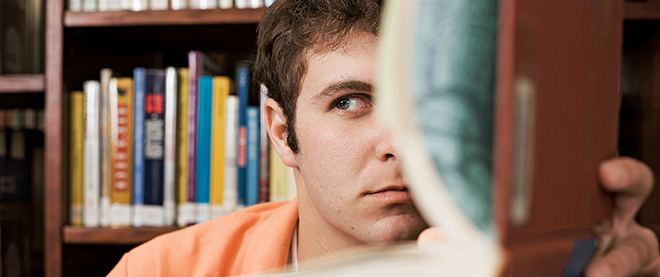Schooling liars
Academic cheaters and plagiarists may not prosper, but they are inventive
Randy Faris/Corbis
Share

Back in January, when Chris Spence, director of education of the Toronto District School Board, faced multiple allegations of plagiarism—including in his Ph.D. dissertation—he resigned without offering excuses. And where most would see this as a good thing, some committed cheats might feel he didn’t protest enough.
The tribunal decisions on those accused of academic offences at the University of Toronto are published online, and the excuses they document show an undeniable (if twisted) creativity. For instance, a certain “Mr. B”—names are customarily redacted—who was found in 2008 to have plagiarized a political science essay and forged a medical note to explain its lateness, claimed that, in a hurry to catch a plane, he’d given a friend (“E”) his essay and the note to submit; “E” had altered the note and printed the wrong document because of “some kind of animus toward him.” When “E” denied involvement, Mr. B said it was actually another person with whom he’d “had a fight.” He then claimed dyslexia had caused him to confuse names and dates, and the plagiarized work was, in any case, simply study notes.
Such ingenuity, flying bravely in the face of reason, makes for entertaining reading. Mr. B’s is one of a number of mind-bendingly convoluted cases (involving egregious and/or multiple offences, or accusations that a student denies in the face of evidence) published by the tribunal. The cases in a given year represent a miniscule percentage of the student body—a fact the U of T’s administration is keen to stress; they’re published to provide transparency, to act as a deterrent and to help the students’ lawyers learn precedence. And while vice-provost Jill Matus notes that “proactive education is probably better than showing the tribunal results,” the cases provide instructional descriptions of the lengths to which some students will go to avoid actually studying.
More than once in the judgments, we read of students having woven what the tribunal called “webs of deception.” One student, “Ms. W,” handed in seven medical notes to obtain deferred exams on the grounds of the flu, hives from a contagious virus, a work-related injury, a car accident and food poisoning. When eventually confronted with the fact that the notes were counterfeit, she said she was the victim of someone who’d stolen a doctor’s identity. “Ms. K,” on the other hand, wrote a letter claiming to be from students who, motivated by race hate, had intercepted two tests that she’d submitted for grade reconsideration and rewritten them to include plagiarism. (Later it was discovered she’d been expelled from Princeton for a similar offence.) “Mr. L,” accused of 84 offences in nine courses, was found to have used an “uncanny ability to exert influence” over two female “friends” who became his girlfriends, attended lectures for him and wrote all of his assignments.
The university’s detective work has extended to hiring a private investigator to track down a “nomadic,” alias-using alleged exam cheater (to darkest Ottawa). That said, there’s apparently little triumph in solving cases: Matus says there’s “a sense of sadness, having verified that somebody has gone so far astray.” Clayton Smith, dean of students at the University of Windsor, which, following the U of T, decided to publish their cases online in 2004, is somewhat more upbeat: “What you feel you’ve achieved is a defining moment for us in making sure that when students earn a degree, they earn a degree.” At Windsor, where the dean of education is currently serving a suspension for plagiarism, Smith says “the notion that people can learn from these things and move on with their lives is what [the cases are] really all about.”
Students—and educators—can draw concrete lessons from these cases. If you say you’re in the Taiwanese air force, don’t leave your LinkedIn page up with your current Toronto employer’s details. If you’re petitioning to defer exams, one relative’s funeral in Florida is believable; three in successive years, perhaps not. If you’re forging a medical note for food poisoning, consider not using the signature of a pediatric psychiatrist. And most of all, pay attention to the case of “Mr. O,” whose “repeated attempts to gain entry into the university’s computer system . . . were unsuccessful but indicated a degree of doggedness, which, if applied to Mr. O’s academic studies, might have obviated his need to cheat.”